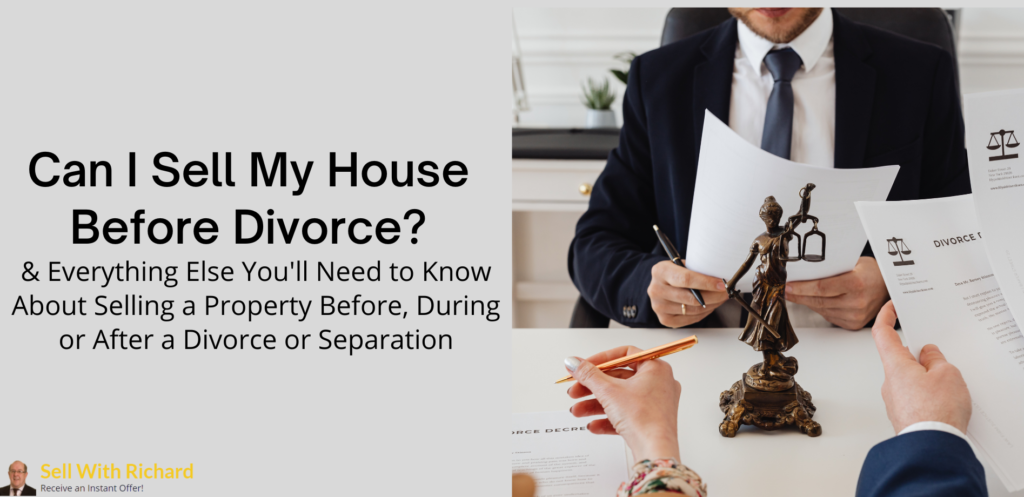
Interactive Guide Index
- Can I sell my house before divorce?
- How is a property split in a divorce?
- Who gets the house in a divorce with children?
- What steps do I need to take when selling a house during divorce or separation?
- What can I do if I have a joint mortgage?
- Should I consider refinancing the family home
- Understanding the rights to your home after divorce
- Talk to the lender
- Does the length of the marriage affect the divorce settlement
- Can a judge force you to sell you home in a divorce?
- What about the end of a civil partnership?
- How can I complete a house sale quickly and get a new start?
If the worst has happened, and you and your spouse are preparing to split, then some difficult discussions will need to take place, and some tough choices made, especially if you’re homeowners.
For instance, you’ll have questions about your property. Who’s going to get it after the divorce? Will you sell the property before divorce, settle for an auction or work out another solution?
It’s best to know all of your options before diving in and making that decision.
We’re going to go through many of the options you have so that you’re a little more prepared for the decisions that you’ll have to make.
Can I Sell My House Before Divorce?
Your main options for the family home are to either sell it or stay in it.
Dividing up assets is one of the hardest parts of a divorce, and the sale of your property can be the toughest of all.
Sometimes, the simple act of figuring out who wants to stay in the house can compound the problem. However, if your ex is willing to work with you, it doesn’t have to be such a difficult process.
Most arrangements are made in the court documents when filing, so make sure that you notate your decision clearly. If you and your ex decide to sell the home, it will be decided in a court hearing.
If you decide to sell your house and split the profits, you have many options for selling it.
There are costs to consider in selling a home as well though, which can further compound the stress of the divorce.
You can put it on the market, sell it at an auction, or sell it to a quick house buying company for a lower price.
What happens to the home is up to you and your spouse, and if you can remain amicable during the divorce proceedings then it’ll help the whole process to run a lot smoother.
If you decide the best option is to sell, then you should have this documented in the court papers and prepare yourself and the house for sale.
If you want to stay in the house and have your ex move out, that can be documented too, and then you will be solely responsible for the mortgage payment.
Keep these things in mind as you go forward with your divorce. For more information call Sell With Richard today.
How is a Property Split in a Divorce?

About a third of all divorce cases end in selling the house, with each party receiving equal shares of the profits.
In legal divorce proceedings, your home will be known as the “former matrimonial home.”
You can choose to stay in your home and take ownership over it as well as the mortgage payments.
You can also buy out your partner’s share of the house and have them move out.
There is also the option to sell it with split profits.
However, if neither of you can agree to terms on the house, then it will go to court, which can lead to neither you or your ex being happy with the outcome, so if you’re able to remain amicable and agree on what to do with the property, then it can help make the divorce process a little easier.
Who Gets the House in a Divorce with Children?
There are instances in the court where ownership is awarded based on having children in the family.
This ownership may last until the children turn 18 or go to college, or you may get the home until you remarry, or sometimes even permanently.
The court will decide what to do concerning the children because the children are most likely settled in their lives, and uprooting them can cause problems.
Traditionally, the mother would end up staying in the home with the children while the father moves out, but this is not always the case.
If you can work out a situation with your spouse to remain living in the house with your children together, you may be able to avoid a court battle for the home.
What Steps Do I Need to Take When Selling a House During Divorce or Separation?
First, you should contact a solicitor to help determine whether or not selling on the market is the right thing to do.
Then, get your home ready for evaluation.
Once you know how much your home is worth, you can begin to get ready for viewings.
Make sure that you have paid any debts that are owed against the home and that the title is in a secured location.
After this, it’s a good idea to carry out any minor repairs and consider giving any ‘tired’ rooms a fresh lick of paint, so the property’s in a more attractive condition for potential buyers. A sale will often take longer to acheive if the property’s not in a great state of repair.
Selling your house may take some time, so be prepared for this. If you choose to sell your home through an auction, it will speed up the process, but you’re less likely to receive the full asking price for it.
On the plus side once the base price is set in an auction, you’ll at least know the minimum that you’ll receive.
You can also use a quick buy firm which may be able to get you cash in days.
It’s up to you to choose the right method of selling your home, but these are some ideas to help you get started, so you know what you’re dealing with ahead of time.
Speak to Richard if you are interested in selling your house fast?
What Can I Do if I Have a Joint Mortgage?
If you have a joint mortgage, one solution is to buy your ex out of the house.
That way, you’d be free of any ties to them, and you’d be able make a fresh start in a property that’s now solely yours.
Another option is to split payments between the two of you. Be careful with this option, because your ex may stop making payments which would leave you to foot the whole mortgage alone.
You can also ask your ex to allow you to stay in the home and take on all the payments yourself if this is a possibility for you financially.
You’ll have to get your ex’s name removed from the mortgage and title if you want to own the home outright. Make sure you call your lender so you can get this started right away.
Be sure to note in your court documents that you want the house and can take the mortgage payments on by yourself.
Hopefully, the court will award you the home, and you can get your ex removed from the title and mortgage.
If the court decides to make you sell the home, then begin getting the home ready for sale.
Should I Consider Refinancing the Family Home?
If you are looking to sell your family home after a divorce, you can think about refinancing so you can access the equity in the property.
You could potentially buy out the share of the home from your ex. If you want to stay in the property, then this may be the ideal solution.
However, many people prefer to sell the home and move on for a fresh start after divorce.
Understanding the Rights to Your Home After Divorce
You may also be wondering what rights you have regarding your home in a divorce.
You can find out if your name is on the title by checking the Land Registry. If your name is not in the registry or the title is in someone else’s name, you can file a Matrimonial Home Rights Notice on the gov.uk site.
You then have the following options when you go to court:
- You can buy the other person’s share outright
- You can sell the property and share the profits equally
- You can stay in the property and transfer the names on the title, or transfer over the home or part of it in a settlement
In England and Wales, you can file a deferment of sale called a “Mesher” which gives you access to the home until a particular event occurs, such as your children turning 18.
You can also file for a “Martin” order where the ownership remains split between the two parties, but one person stays in the house for life or until they remarry.
This way, you can keep your house during a divorce, and it avoids having to answer the question, should I sell my property?
If you are still married, then according to the Family Law Act 1996:
- You can remain in the home unless ordered by the court to leave
- You will be notified of any kind of repossession action being taken against you by the mortgage lender
- If you had moved out of the home, the court could allow you to return
- If the person named on the mortgage fails to make payments, you can pay the mortgage yourself and stop the repossession of the property
Talk to the Lender
If you are in the middle of a separation, the best thing you can do is talk to your lender right away. This will prove to be an important step, especially as you decide how to keep up with the mortgage payments in the meantime.
Divorce rights to the property need to be set, which can prevent your ex from transferring, selling, or even mortgaging the property without your knowledge. If your ex owns property that is in their name alone, you can protect your own property rights by registering with the Land Registry.
Does the Length of the Marriage Affect the Divorce Settlement?
If you have been married longer, then it may not be as easy as splitting up the marital property and marital assets. In any long term marriage, the law typically assumes that one spouse has been relying on the other’s income. So, once the divorce happens, the spouse who has been earning the lower income may find themselves with the greater share of each marital asset.
The courts deem it unfair to lower the standard of living for the spouse who had less earning potential. If there are children, then, of course, their welfare is also taken into account.
A long term marriage is generally considered a marriage that has lasted over 15 years. A short term marriage has a length of between 1 and 5 years while the middle ground places marriage in the 5 to 15-year mark. If you and your spouse lived together before the marriage, the court might also take this into account.
Can a Judge Force You to Sell Your Home in a Divorce?

Simply put, yes. In some situations, a judge can force you or your spouse to sell the home in a divorce. However, they will have to consider a number of circumstances before making this call. For example:
- Did you and your spouse purchase the home together?
- How much equity is in the home?
- What are the ages of your children?
- Who will be the primary caregiver following the divorce?
- Do the children have a secure home?
- Why are you getting divorced?
- What are the financial circumstances going to be following divorce?
- Does it make more sense to sell the home or keep it?
The judge will consider all of these circumstances and will rule within the law. If the house needs to be sold, then the married couple needs to follow the court order. However, they can choose to appeal, but this will rack up more court costs.
What About the End of a Civil Partnership?
Let’s say you and your partner were never legally married, and instead, you had a civil partnership. A civil partnership is a legal relationship between two registered individuals who aren’t related to each other. When registering, you are given legal recognition of the relationship.
For a civil partnership, both partners have to draw up an agreement, known as a pre-registration agreement, before legal registration. This would set your rights and obligations towards each other if the relationship were to end.
This agreement can include arrangements for children, property, pensions, as well as the family home. Pre-registrations are not legally binding but can influence the court’s decision when the relationship ends, and there is shared property that needs to be divided.
How Can I Complete a House Sale Quickly and Get a New Start?
There are several options for selling a house after divorce quickly.
One of them is to have a property sale.
You can also put your home up for auction. That way you can get your home sold quickly and you’ll have a base set price that can only go up through the auction.
Another way you can sell quickly is to offer your home to a quick property buying company.
They will buy your home quickly and easily…quicker than putting it on the market or having a property sale, and you can even sell before divorce proceedings start, which will be one less asset to worry about splitting.
And not only that, but you will get your cash in days.
Speak to Richard if you are interested in selling your house fast?

About Richard Mews
Richard has 31+ years of property experience, has been Chairman of several regeneration committees and has helped more than 600 homeowners and landlords get easy, stress-free personal solutions for selling their property. Richard’s goal is to give you unbiased help to receive a quick house sale, even if that means not working with him.
Let’s connect:





